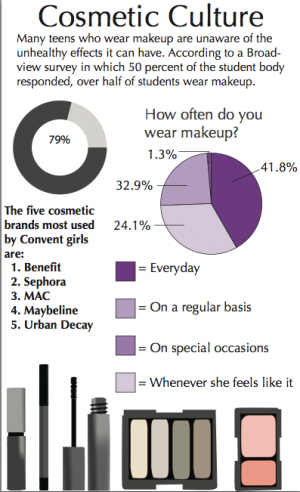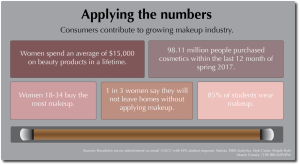Personal care products may pose serious health risks
Shampoo, conditioners and skin care lotion chemicals can disrupt hormones.

December 16, 2017
Showering with shampoo and conditioner, rinsing with an army of skin care products, or even putting on makeup may seem important for maintaining a healthier, cleaner lifestyle, but many personal care products contain harmful and unsafe chemicals that could have detrimental health effects in the future.
The Health and Environmental Research in Make-up Of Salinas Adolescents (HERMOSA) Study monitored 100 teen girls in Salinas during a three-day period in which they cut all of their normal personal care products out of their daily routines. Instead, they used pre-approved alternatives that did not contain any of the chemicals researchers were worried about.
“The study was concerned about chemicals in makeup and other personal care products that might act like hormones and mimic estrogen,” Dr. Kim Harley — associate Director for Health Effects at UC Berkeley’s Center for Environmental Research and Children’s Health — who led the study said. “We were particularly concerned about teenage girls [who] use a lot of makeup and a lot of other personal care products, and are going through a time of reproductive development.”
After comparing urine samples from before and after a three-day study period, Harley found significant results.
“On average we saw that levels of chemicals — the different hormone-disrupting chemicals — went down between 25 percent and 45 percent just in three days of using different products,” Harley said.
Some chemical ingredients in personal care products may mimic hormones such as estrogen and are suspected of provoking breast cancer, according to Harley.
“Our project was funded by the California Breast Cancer Research Program because they’re interested in how these hormone disrupting chemicals might impact breast cancer much later down the road,” Harley said. “We don’t have strong evidence that these chemicals do cause breast cancer, but we have enough evidence from animal studies to be concerned.”
Junior Worth Taylor says she only purchases organic or natural skin care products in effort to eliminate chemicals from her daily routine.
“I do not use any Sephora makeup or drugstore makeup,” Taylor said. “I only use things that are made with ingredients that I can pronounce or that I know rather than chemicals and things I learn about in chemistry class.”
Although a good method to avoid harmful chemicals, reading labels may not always prove to be reliable. Many fragrances contain phthalates, a group of chemicals that are commonly found in vinyl flooring and have affected the reproductive system in animal testing, according to the Center for Disease Control and Prevention.
Because fragrance recipes are considered proprietary and a trade secret, fragrance companies are not required to list phthalates as ingredients and instead simply write the word “parfum,” according to Harley.
“That is why, in general, if it is fragrance free, that is better,” Harley said. “If it doesn’t have ‘parfum’ or fragrance on the label, that’s good. But if you really want a fragrance, natural fragrance is better.”
Even though there is widespread concern for the safety of a particular personal care product, the Food and Drug Administration can do little about it, according to Harley.
“The FDA doesn’t have very strong regulatory powers when it comes to cosmetics,” Harley said. “The FDA was started by a law called the Drug and Cosmetics Act. In theory the Act was to oversee food, drugs and cosmetics, but the reality is the FDA has really strong powers over food and drugs and it has very weak power over cosmetics.”
Senators Dianne Feinstein and Susan Collins introduced the Personal Care Products Safety Act in May to amend the Federal Food, Drug and Cosmetic Act. The bill would strengthen the FDA’s authority to regulate ingredients in personal care products.
Some hair care products, such as Brazilian Blowout, contain formaldehyde — a known carcinogen. A hairdresser raised concern when they began having nosebleeds, eye irritation, and trouble breathing while using the product labeled “formaldehyde-free,” according to the Occupational Safety and Health Administration.
“The FDA could not do anything about it,” Harley said. “The FDA sent a very stern letter to the company saying ‘Please don’t do this anymore,’ but that was all they could do and the company had no recourse.”
Using apps such as Think Dirty – Shop Clean and the Environmental Working Group’s Healthy Living, which scan products’ barcodes and give a rating on their safety, are easy ways to find products with fewer chemicals, according to Harley.
“Everyone’s so conscious about what food they eat and eating healthy when what you put on your body is just as important,” Taylor said. “If you are putting chemicals on your skin, that’s going to cause as much harm as eating something that’s full of preservatives. It’s just as bad for you.”













